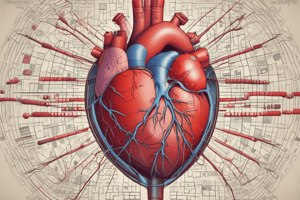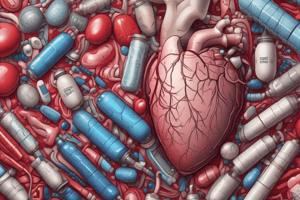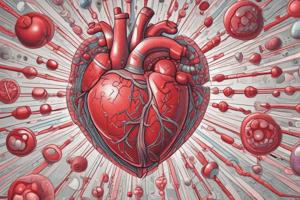Podcast
Questions and Answers
What is the primary mechanism of action of ACEIs in reducing blood pressure?
What is the primary mechanism of action of ACEIs in reducing blood pressure?
- Blocking the conversion of angiotensin I into angiotensin II (correct)
- Blocking Ca2+ influx across cardiac and vascular smooth muscle
- Stimulating nitric oxide release
- Relaxing vascular smooth muscle through direct action
Which of the following is a therapeutic use of ACEIs in animals?
Which of the following is a therapeutic use of ACEIs in animals?
- Treatment of seizures
- Management of chronic kidney disease
- Management of gastrointestinal disease
- Management of heart failure (correct)
What is a common adverse effect of ACEIs, especially when used with a K+-sparing diuretic or K+ supplement?
What is a common adverse effect of ACEIs, especially when used with a K+-sparing diuretic or K+ supplement?
- Hyperkalemia (correct)
- Tachycardia
- Bradycardia
- Hypotension
Which of the following vasodilators reduces systemic vascular resistance and arterial blood pressure?
Which of the following vasodilators reduces systemic vascular resistance and arterial blood pressure?
What is the mechanism of action of hydralazine?
What is the mechanism of action of hydralazine?
What is a therapeutic use of amlodipine in dogs?
What is a therapeutic use of amlodipine in dogs?
What is a common adverse effect of hydralazine?
What is a common adverse effect of hydralazine?
How long does the effect of amlodipine last?
How long does the effect of amlodipine last?
Which of the following effects of vasodilators is most beneficial in terms of cardiac output?
Which of the following effects of vasodilators is most beneficial in terms of cardiac output?
Why are ACEIs usually not the first choice for managing hypertension in cats?
Why are ACEIs usually not the first choice for managing hypertension in cats?
What is the primary mechanism of action of amlodipine in reducing blood pressure?
What is the primary mechanism of action of amlodipine in reducing blood pressure?
Why is hypotension less likely to occur with amlodipine compared to hydralazine?
Why is hypotension less likely to occur with amlodipine compared to hydralazine?
Which of the following is a common adverse effect of vasodilators?
Which of the following is a common adverse effect of vasodilators?
Why are ACEIs converted to their active form in the liver?
Why are ACEIs converted to their active form in the liver?
What is the primary effect of vasodilators on cardiac output?
What is the primary effect of vasodilators on cardiac output?
Which of the following is a therapeutic use of hydralazine?
Which of the following is a therapeutic use of hydralazine?
Flashcards are hidden until you start studying
Study Notes
ACE Inhibitors
- Block the conversion of angiotensin I into the active angiotensin II
- Induce vasodilation and decrease blood pressure
- Decrease aldosterone secretion, a hormone that promotes renal Na+ retention
- Most ACEIs (except captopril and lisinopril) are prodrugs converted to active form in the liver
- Therapeutic uses: chronic management of heart failure, management of arterial hypertension in dogs
- Adverse effects: hypotension, hyperkalemia (especially with K+-sparing diuretic or K+ supplement)
Vasodilators
- Decrease systemic vascular resistance and arterial blood pressure
- Decrease afterload on the heart
- Improve forward cardiac output flow
- Relax systemic veins and increase venous capacitance
- Decrease cardiac filling pressures (preload)
Hydralazine
- Mechanism of action: stimulates nitric oxide release by endothelial cells
- Pharmacologic effects: relaxes vascular smooth muscle
- Therapeutic uses: treatment of myocardial failure and hypertension
- Adverse effects: hypotension and reflex tachycardia
Amlodipine (NorvascR)
- Mechanism of action: blocks Ca2+ influx across cardiac and vascular smooth muscle
- Pharmacologic effects: exerts mainly vasodilating effects, with no appreciable cardiac effects
- Therapeutic uses: first choice for hypertension in cats and dogs, used in dogs with refractory CHF
- Administration: oral, metabolized by the liver, effect lasts 24 hours
- Adverse effects: hypotension possible, but less likely than with hydralazine
ACE Inhibitors
- Block the conversion of angiotensin I into the active angiotensin II
- Induce vasodilation and decrease blood pressure
- Decrease aldosterone secretion, a hormone that promotes renal Na+ retention
- Most ACEIs (except captopril and lisinopril) are prodrugs converted to active form in the liver
- Therapeutic uses: chronic management of heart failure, management of arterial hypertension in dogs
- Adverse effects: hypotension, hyperkalemia (especially with K+-sparing diuretic or K+ supplement)
Vasodilators
- Decrease systemic vascular resistance and arterial blood pressure
- Decrease afterload on the heart
- Improve forward cardiac output flow
- Relax systemic veins and increase venous capacitance
- Decrease cardiac filling pressures (preload)
Hydralazine
- Mechanism of action: stimulates nitric oxide release by endothelial cells
- Pharmacologic effects: relaxes vascular smooth muscle
- Therapeutic uses: treatment of myocardial failure and hypertension
- Adverse effects: hypotension and reflex tachycardia
Amlodipine (NorvascR)
- Mechanism of action: blocks Ca2+ influx across cardiac and vascular smooth muscle
- Pharmacologic effects: exerts mainly vasodilating effects, with no appreciable cardiac effects
- Therapeutic uses: first choice for hypertension in cats and dogs, used in dogs with refractory CHF
- Administration: oral, metabolized by the liver, effect lasts 24 hours
- Adverse effects: hypotension possible, but less likely than with hydralazine
Studying That Suits You
Use AI to generate personalized quizzes and flashcards to suit your learning preferences.




